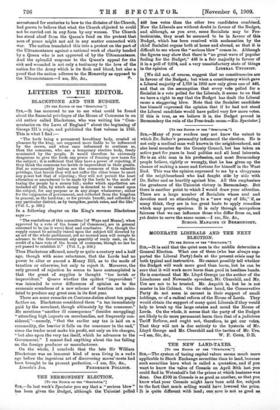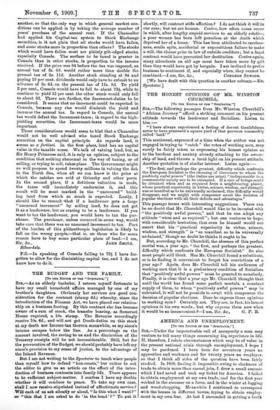THE NEW LAND-TAXES.
[To THE EDITOR OP THE "SPECTATOR."] SIB,—The system of taxing capital values seems much more applicable to Stock Exchange securities than to land, because such securities have what is called a quotation, and if you want to know the value of Consols on April 30th last you could find in Wetenhall's list the prices at which business was done. One 2100 in Consols is as good as another, so that you know what your Consols might have been sold for, subject to the fact that much selling would have lowered the price. It is quite different with land; one acre is not as good as another, so that the only way in which general market con- ditions can be applied is by taking the average number of years' purchase of the annual rent. If the Chancellor had applied his Capital-tax system to Stock Exchange securities, is it not plain that all stocks would hava fallen, and some stocks more in proportion than others ? The stocks which would have fallen most are plainly gilt-edged stocks, especially Consols. The surface to be taxed is greater in Consols than in other stocks, in proportion to the income received. If the price was 84 before the tax was imposed, an annual tax of 3s. 6d. would rather more than double the present tax of 2s. 11d. Another stock standing at 84 and paying 10 per cent, dividends would only have to submit to an advance of 3s. 6d. on the present tax of us. 8d. To yield 3 per cent., Consols would have to fall to about 73i, while to continue to yield 12 per cent, the other stock would only fall to about 83. There are, further, the Increment-duties to be considered. It seems that no increment could be expected in Consols, because any rise would diminish the yield and increase the annual tax. In regard to Consols, the annual tax would defeat the Increment-taxes ; in regard to the high- yielding securities, the Increment-taxes would be more important.
These considerations would seem to hint that a Chancellor would not be well advised who taxed Stock Exchange securities on the capital principle. As regards land, it seems so a fortiori. In the first place, land has no capital value in the taxable sense. We talk of valuing land, but, as Sir Henry Primrose said, it is only an opinion, subject to the condition that nothing abnormal in the way of taxing, or of selling, or trying to sell, takes place The Government might as well propose to spend twenty millions in valuing the fish in the North Sea, when all we can know is the price at -which the catches are sold at Grimsby and other ports In the second place, if a fictitious valuation is made, the taxes will immediately undermine it, and this result will be most marked in the " uncovered " build- ing land from which so much is expected. Lastly, I should like to remark 'that if a landowner gets a large "unearned increment" by selling land, he does not get it as a landowner, but as ceasing to be a landowner. If you want to tax the landowner, you would have to tax the pur- chaser. The purchaser, unless cornered in some way, would take care that there was no unearned increment to tax. Part of the burden of this philanthropic legislation is likely to fall on the wrong people,—that is, on those who for some reason have to buy some particular piece of land.—I am, Silverdale.
P.S.—In speaking of Consols falling to 731 I have for- gotten to allow for the diminishing capital tax, and I do not know how to do it.































































 Previous page
Previous page